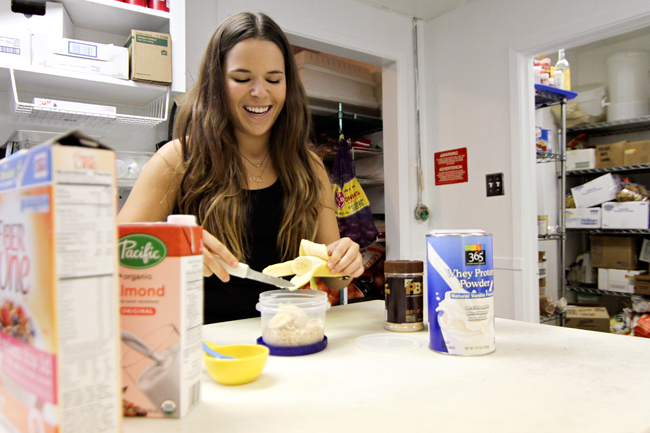Claire Siegel, a nutrition and Plan II senior, said she will never forget that afternoon she spent searching the Internet for things like “how to not get fat abroad” and “how to stay skinny abroad,” yet couldn’t find a single relevant how-to guide.
“I just wanted a student who was going through what I was going through to help me out, give me tips, anything,” Siegel said. “Since I couldn’t find it being done by anyone else, I just figured I might as well be the one to do it.”
The Slender Student is a blog Siegel launched this past summer after she gained close to 10 pounds abroad. The blog, which predominantly targets college students, chronicles her journey to “slenderhood” post-Barcelona while also teaching readers ways to make unhealthy meals healthier, workout routines designed to target specific muscle groups and the health benefits behind different ingredients and recipes.
As a child she said she knew she was overweight and needed to lose weight. Consequently, her mother recommended she see a dietitian, sparking her early interest in nutrition.
“It was almost embarrassing, since I was so young when I went,” Siegel said. “I just remember feeling embarrassed that I was different and that I needed help.”
Now as a senior, the tables have turned, as Siegel is the one advising nearly 400 viewers each day. Her suggestions for becoming slender include ways to navigate grocery stores in search of healthy foods, lazy Sunday study foods, how and what to order at various restaurants and a variety of recipes, workouts and health advice.
She believes these tips are beneficial because, Siegel said, the college lifestyle is not conducive to losing weight and is one of the reasons she hopes her blog will continue to target and inspire college students who are struggling with similar problems.
“Sometimes I’ll do great Monday through Thursday, but then Thursday through Sunday I’ll totally blow it,” Siegel said. “I want to have fun, I’m a senior. If a night on Sixth is what’s on the agenda, I’m not going to hold back and stay at home just because I want to eat healthy the next day.”
Friends and extreme zealots of Siegel’s blog credit her tips with easing the transition from all-you-can-eat dorm food to learning to cook healthy.
“It’s not that I didn’t know how to cook before, I just didn’t really know what to cook,” said Brittany Rasansky, a communication sciences and disorders senior and avid reader of the blog. “Most nights I just made grilled chicken.”
The inspiration for her blog comes from activities Siegel does on a day-to-day basis and her reading material, which includes Self Magazine, Women’s Health and, of course, her school curriculum.
“I just made something that I’m going to post on the blog and timed it so I can have it for dinner tonight,” Siegel said. “I try to make it as true to life as possible. The blog keeps me accountable.”
Food blogs are abundant online, but those close to Siegel said they had yet to see blogs by nutritionists or even college students that told readers more than how to cook a meal.
“The thing about most food blogs is they just give you the recipe and move on,” Rasansky said. “The Slender Student will give you the recipe and the nutritional benefits behind it.”
Siegel stresses the importance of remaining realistic and accepting not every day will be a great one. She says her dietary rule of thumb is everything is good in moderation in terms of exercising and eating.
“In college it’s easy to let yourself go, but it’s important to stay healthy,” psychology junior Melissa Leva said.
Once Siegel becomes a registered dietitian, she plans to continue her blog but open it up to become an online forum for the community where her prospective clients can create accounts and have web-based communication.
“I know the name of the blog is The Slender Student, but you can always be a student of slenderhood,” Siegel said.
Inevitably, slip-ups make up a part of the daily grind, but Siegel and her slender-hopefuls just have to do even better the next day.
“You should never deprive yourself, to deprive yourself is to set yourself up for failure,” Siegel said. “You have to be realistic about what you want and how you’re going to obtain it. The only reason people feel frustrated is because they lose motivation or focus.”
Printed on Tuesday, October 23, 2012 as: Student blog offers health advice, diet tips





















